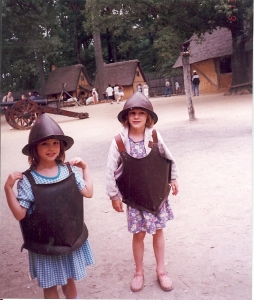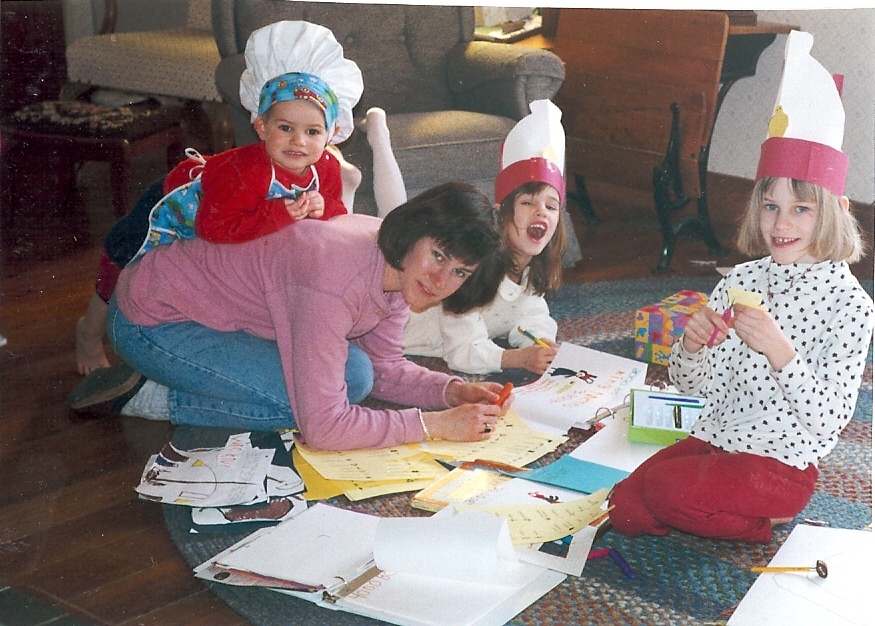
I can’t say if it does or not – I haven’t read much of it yet. A glance through the table of contents took me straight to the Appendices. One of these Caldecott has titled “Tolkien for Homeschoolers.” As a homeschooler-turned college-student myself, this chapter grabbed my attention immediately. In it, Caldecott outlines several ways in which Tolkien’s books can be taught to children, and offers examples of subjects that one could approach through Tolkien’s works: Language, Philosophy, Religion, Nature, Geography, History, Mythology, and Art. For example, Caldecott writes of Language, “Many children try their hand at making up a secret language or code. Why not give them a helping hand…Why not pick up a little Elvish, while mastering Spanish and Latin?” He also suggests that one make a study of the plants and flowers Tolkien mentions, or use Tolkien’s maps to learn the principles of geography and teach children about how land forms change over time, or compare the creation stories of various mythologies with that in Tolkien’s Silmarillion.
These are all interesting ideas, and certainly worth exploring. One can learn countless aspects of many subjects from Tolkien’s works – unsurprisingly, as he was a scholar himself. However, I disagree with Caldecott over the manner in which this learning should take place.
I believe Tolkien’s books do not need to be, and often shouldn’t be, taught. I certainly never approached The Lord of the Rings from an academic standing, and am endlessly thankful for this. My father spent many hours reading The Lord of the Rings aloud to my sister and I in the evenings, as a bedtime story. These moments were special – a reward for staying focused on school work all day, and an important time of bonding between my father and his daughters. We certainly talked about the book during the day, but it never was an integral part of our homeschooling curriculum.

The topics that Caldecott mentions, Language, Philosophy, Religion, and so forth, are all areas I have explored in relation to Middle-earth. However, this exploration and learning was done on my own time, and most of it after I reached high school (Caldecott seems to gear most of his instructional activities towards rather younger children). Because I pursued these ideas of my own volition, I developed a passion both for Tolkien’s works and for the many ways they unfold and connect with our own world. Had my parents’ motivation for teaching me about the flora and fauna of my childhood haunts been based on the plants and animals mentioned in Tolkien’s books, I would have lost interest in the stories, and also in learning about the natural world around me.
The benefits Caldecott lists that children may get from being taught Tolkien are all things I discovered on my own, and thus loved more than I would have had they been gently forced upon me as a child. I became deeply interested in Tolkien’s languages, and began teaching myself Elvish in junior high school. I share Tolkien’s dislike of Allegory, and yet came on my own to realize that Tolkien’s legendarium could teach me more about the Christian faith than many a glossy devotional. I am fascinated by maps, especially old ones, and Tolkien’s geographic work has inspired my own study of what exactly makes a good sub-created geography. I dove blissfully into the study of Anglo-Saxon, Middle English, and Old Norse because of the fascination Tolkien’s histories have given me for old things, and especially old languages. Reading The Silmarillion taught me an appreciation for Beauty of all kinds, which has developed into a love of creating Middle-earth-inspired art of my own. These are not things that can be taught through a curriculum, homeschooled or not.
There are some things that children must discover on their own. One cannot be taught The Lord of the Rings and be expected to carry that limited learning on into one’s own, wider studies with the same passion as one who discovered Middle-earth on his or her own (though I am quite sure there are exceptions to this). Rather than teaching Tolkien or integrating his works into a curriculum, as Caldecott suggests, I think these books, and others like them, are better left for exploration after the textbooks have been set aside, the table cleared of markers, pens, and notebook paper, and the whirlwind that is homeschooling cleaned up (or at least shoved into a closet with a door that closes tightly). What better way to teach children the wonder of Enchantment than to present it to them as such, rather than as a thing to be learned, studied, and tested upon? Tolkien for Homeschoolers? Yes. By all means, yes. Tolkien as curriculum? No. Perhaps it’s best to let Middle-earth teach itself in its own time instead.

Super interesting, Anna. I, too, feel that my strongest academic and personal interests came from things I discovered on my own, apart from any sort of structured learning or teaching. BUT I think that my willingness and ability to pursue those interests to the extent that I have, starting from such a young age, came from the way in which we were taught–a way which is perhaps only possible within a homeschooling setting. I don’t know of any other educational mindset that simultaneously encourages curiosity and gives students the tools they need to pursue what they discover on their own in such a rigorous way.
LikeLike
That’s quite true – homeschooling does seem to be rather unique in that way. I’m ever so thankful for the homeschooled education we got, and the way it allowed me to be excited about what I was learning – and what I was discovering on my own. This summer research process is so exciting because I’m studying Tolkien of my own free will – it’s something I discovered on my own, without help from any curriculum, and so it’s even more exciting to research. =)
LikeLike
Anna, love the pictures of those cute little kids! Hope all is going well with you. We talked to your sister a few days ago. As usual she seems fine.Love and miss you. Granny
LikeLike
Amen! I never read an “analysis” of those books until I was in high school, and I picked that up of my own free will. But I’m glad I didn’t have it as a child – it’s so much more beautiful to discover things on your own. They bleed into your heart slowly, rather than being surgically implanted (weird, not-so-good analogy – sorry XD). All the learning I loved the most happened that way, to be honest. :)
Some scholars do think this way, btw. There’s a lovely book called Live Like a Narnian by a man named Joe Rigney, which my mother acquired at some point. I approached it cautiously, but he made me happy with the ending of his introduction:
“Finally, while I would discourage giving this book to children directly (just give them Narnia; when they’re older they can read these chapters to learn some of what Narnia has been doing to them), I do hope that my modest efforts will benefit them in a roundabout way. In particular, I’d like Christian parents to come away eager to intentionally read the stories to their children, in hope that another generation will be shaped, molded, and matured into men and women of God, the kind that resemble the Lion of Narnia, and therefore, bear the image of the true king, Jesus Christ.”
So never fear. You’re not alone in thinking stories should be read, not taught. ;) They work best that way.
Sorry. That was a rant. But it was fun. So not sorry. =D And I miss you. ;)
LikeLike
I like your weird, not-so-good analogy. It’s not half bad. =)
The book sounds interesting – I shall have to look this up. I like this man already. I’ve never read much about Narnia – just read Narnia itself. It would be interesting to find out some of what Narnia has done to me =)
I miss you too. Skype date? Also, your rant-comments are the best. No apology needed, ever.
LikeLike
Little-you is adorable and little-Luke is just…*snickers* But anyway. This is kind of interesting, since my first time reading LotR was for school (sixth grade, I believe); I had questions to answer and activities to do, and I enjoyed the story and all but my interest eventually died away till I got into TPS three years later and met you and all that good stuff. So. Corroboration. =D
LikeLike
Ah. Validation. My ideas are grounded! Thanks, dear. =) Also, I think Tolkien-enthusiasm is somewhat catching. Sometimes it takes fellowship with like-minded people to make it blossom. And so with many things, I suppose – not just Tolkien, or books.
LikeLike
Yes, I completely agree! I don’t think I would love Middle Earth as much if I had to study it in school. My older siblings were really into The Lord of the Rings. When I was little I wanted to keep up with them. Most of the classics that I am in love with I have wanted to read before I was old enough to read it on my own.
LikeLike
I know exactly what you mean! My sister is two years older than me, and I vividly remember the day my mother told me I would be following a different, easier curriculum in school than her. Little Me was quite upset, as I wanted so badly to keep up with my big sister.
LikeLike